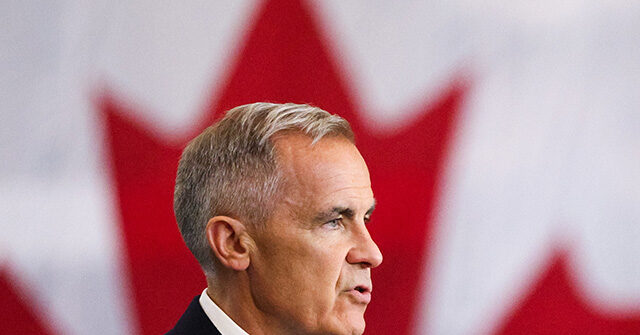The government of Canada addressed the United Nations on the last day of its annual General Assembly on Monday, but leftist Prime Minister Mark Carney was notably absent, having attended as an audience member for much of last week.
Carney, the Canadian Press observed last week, used the Assembly “to meet with CEOs and world leaders in an ongoing effort to diversify Canada’s trade and economic opportunities.” His most high-profile meeting in New York was with Chinese Premier Li Qiang, in town to represent genocidal communist dictator Xi Jinping – a cordial affair that Carney described in a social media message as “engaged.”
On Monday, however, Canadian Foreign Minister Anita Anand represented her country on the stage, delivering a speech full of platitudes about the “multilateral system [being] under threat” and defending Canada’s choice to recognize “Palestine” as a country.
In a bilingual English/French speech, Anand warned that “some countries are looking more inward, looking at protectionism and unilateralism,” without naming any suspects. “Around the world the geopolitical landscape is unstable.”
Anand promised that “innovative leader” Canada “does not shrink from global challenges” and would seek cooperation with friendly countries.
“Canada remains a stable and reliable partner both in business and collective security,” she promised, listing the country’s values as “promoting democracy and pluralism, balancing and maintaining human rights, fostering gender equality, protecting our equality, and working with indigenous partners on sustainable development and prosperity while safeguarding our environment.”
Anand touched on only two specific foreign policy topics — the ongoing Russian invasion of Ukraine and the war between Israel and Hamas — and concluded her speech with a lofty quote from former United Nations Secretary-General Kofi Annan.
“As former U.N. Secretary-General Kofi Annan once said, ‘In an era of global challenges, the world needs multilateralism now more than ever. No nation can solve its problems alone,’” Anand said.
Given Carney’s decision to attend the General Assembly and leave before his country’s representative spoke, Anand’s speech generated little enthusiasm. Much of the focus of Canada’s participation at the General Assembly instead focused on Carney’s meeting with Li Qiang. Carney, a leftist appointed to be prime minister after predecessor Justin Trudeau resigned, was working a year ago as a high-ranking executive with Brookfield Asset Management, a private company conducting close business with China. In October 2024, before Trudeau’s resignation, Carney visited China on Brookfield’s behalf and proclaimed it a fine foreign investment destination – contrary to the extensive economic data showing that post-pandemic China’s economy has failed to recover from the atrocities committed in 2020 and beyond in the name of containing the disease.
Canadian outlets reported during Carney’s campaign to keep the prime ministership in April that the Brookfield executive “expressed strong confidence in the development prospects and growth potential of investing in China” and secured a sweetheart loan for Brookfield in China shortly after returning home.
Independently, Canada’s Security and Intelligence Threats to Elections (SITE) Task Force, charged with election integrity monitoring, found in April that Carney was the target of beneficial “coordinated inauthentic behaviour” online on the Chinese social media application WeChat, used by many Chinese-Canadians. SITE, under the government Carney was then running, determined ultimately that the propaganda in question did not affect the election.
Carney’s optimism about China remained following his meeting with Premier Li.
“We’re building a constructive, pragmatic dialogue to create more certainty and prosperity for both our nations,” Carney promised.
The Canadian Prime Minister’s Office celebrated “recent productive engagements” between Canada and China following the meeting and stated that Ottawa would continue engaging in friendly outreach to the communist regime.
Carney, who has been aggressive in condemning President Donald Trump’s imposition of tariffs on unrelated countries, has remained mum in the face of a barrage of tariffs on Canadian products from Beijing. China imposed a 75.8-percent tariff on Canadian canola oil in August, in addition to several other tariffs on pork and seafood products. Canada, in turn, imposed a 100-percent tariff on Chinese electric vehicles (EVs), which Beijing used to excuse the canola tariffs.
Following his meeting with Li, Carney told reporters that he hopes to meet Xi Jinping in person.
“I will expect, at the appropriate time, to be meeting with President Xi Jinping but [also] continuing this dialogue with the premier,” the CBC quoted Carney as saying, praising his conversation with Li as “constructive.”
Chinese state media immediately questioned Carney’s optimism following the meeting with Li, taunting Ottawa as a mere puppet of the United States. While praising the pro-China Carney as a “more pragmatic” leader than Trudeau – who has openly celebrated the Chinese totalitarian regime – the Chinese state-run Global Times outlet asked “whether Canada can truly break free from the US shadow.”
“Hopefully, Canada can formulate an independent and rational policy toward China based on its own national interests, rather than blindly following the US,” the Times, which often serves as a regime mouthpiece, proposed. “Beijing and Ottawa have great potential for cooperation in complementary fields, such as energy, the green economy and agriculture.”
Carney attended President Trump’s General Assembly speech on Tuesday and an event hosted by the American president, but did not receive a one-on-one audience with Trump this week.
Follow Frances Martel on Facebook and Twitter.
Read the full article here



